SRMAP Departmental Events
- “Health in Our Hands”- an interactive session with Dr Srimadhuri on World Health Day April 7, 2021
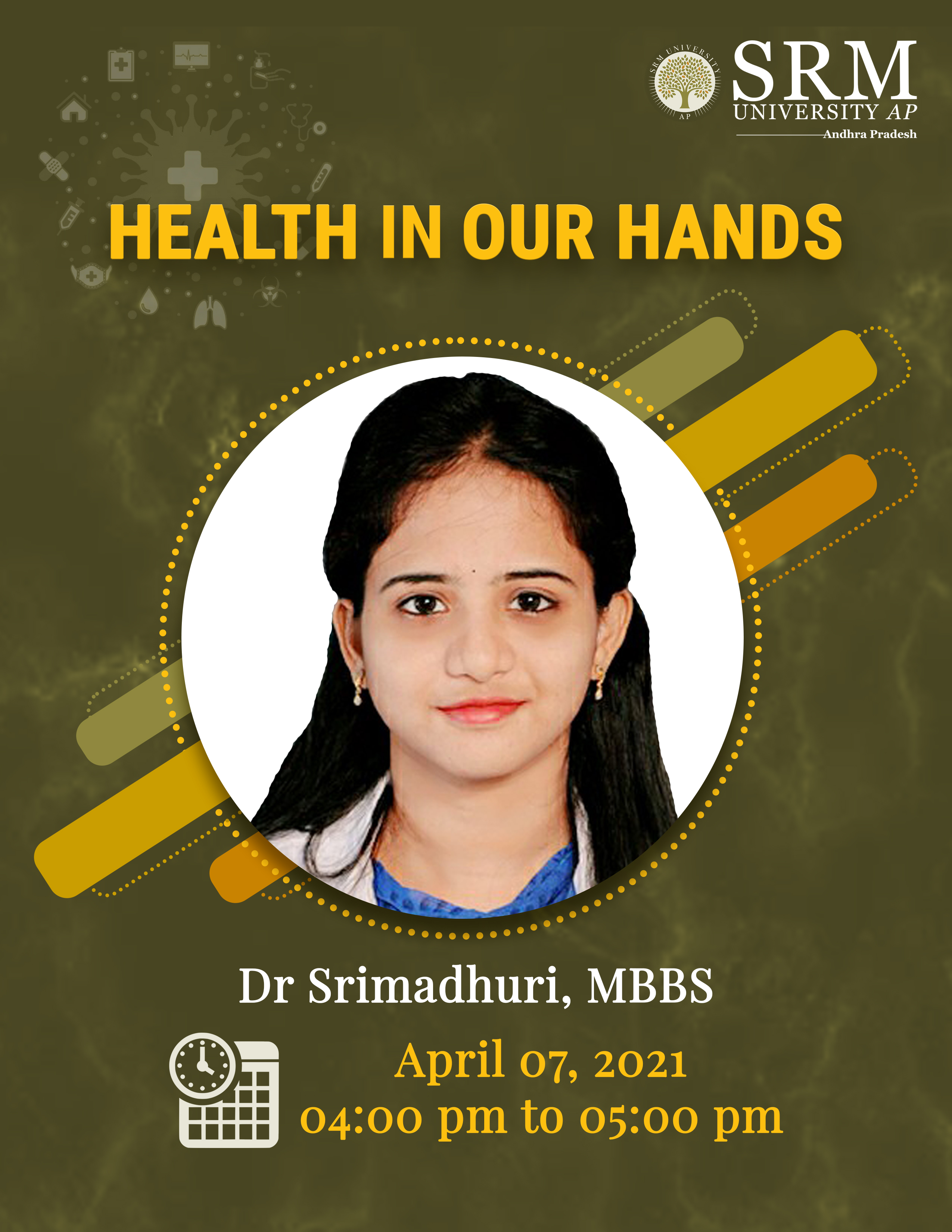 On the auspicious occasion of World Health Day, the Department of Student Affairs organises a very special session for the students of SRM University-AP. As Ralph Waldo Emerson rightly said, “The first wealth is health,” we often forget that. Especially in the thrill of the invigorating youth, students tend to neglect their health and suffer later. Needless to say that we all should remember that health is the most important thing in everyone’s life. A few good practices can keep the diseases away and make your life worthwhile. “Health in Our Hands”, presented by Dr Srimadhuri, will enlighten the students on some substantial problems that the youth of this generation face. She will also share the present scenario regarding COVID-19 and the ideal stand to keep oneself safe from the disease. The session will not be limited to problems related to the students. The faculty and staff will also be benefitted by listening to Dr Srimadhuri’s advice.
On the auspicious occasion of World Health Day, the Department of Student Affairs organises a very special session for the students of SRM University-AP. As Ralph Waldo Emerson rightly said, “The first wealth is health,” we often forget that. Especially in the thrill of the invigorating youth, students tend to neglect their health and suffer later. Needless to say that we all should remember that health is the most important thing in everyone’s life. A few good practices can keep the diseases away and make your life worthwhile. “Health in Our Hands”, presented by Dr Srimadhuri, will enlighten the students on some substantial problems that the youth of this generation face. She will also share the present scenario regarding COVID-19 and the ideal stand to keep oneself safe from the disease. The session will not be limited to problems related to the students. The faculty and staff will also be benefitted by listening to Dr Srimadhuri’s advice.Dr Srimadhuri has completed her Bachelor of Medicine and Bachelor of Surgery (MBBS) from NRI Institute of Medical Sciences, Visakhapatnam, under the affiliation of Dr NTR University of Health Sciences. Dr Srimadhuri is a young and brilliant doctor who is currently associated with the Ramesh Hospitals, Guntur, as a Medical officer at the Department of Cardiology and Paediatrics.
Enthusiasts are requested to join the webinar on April 07, 2021, at 4 pm to know more from Dr Srimadhuri herself.
Continue reading → - “PDEs and Digital Images”- in discussion with Dr Vijayakrishna Rowthu April 7, 2021
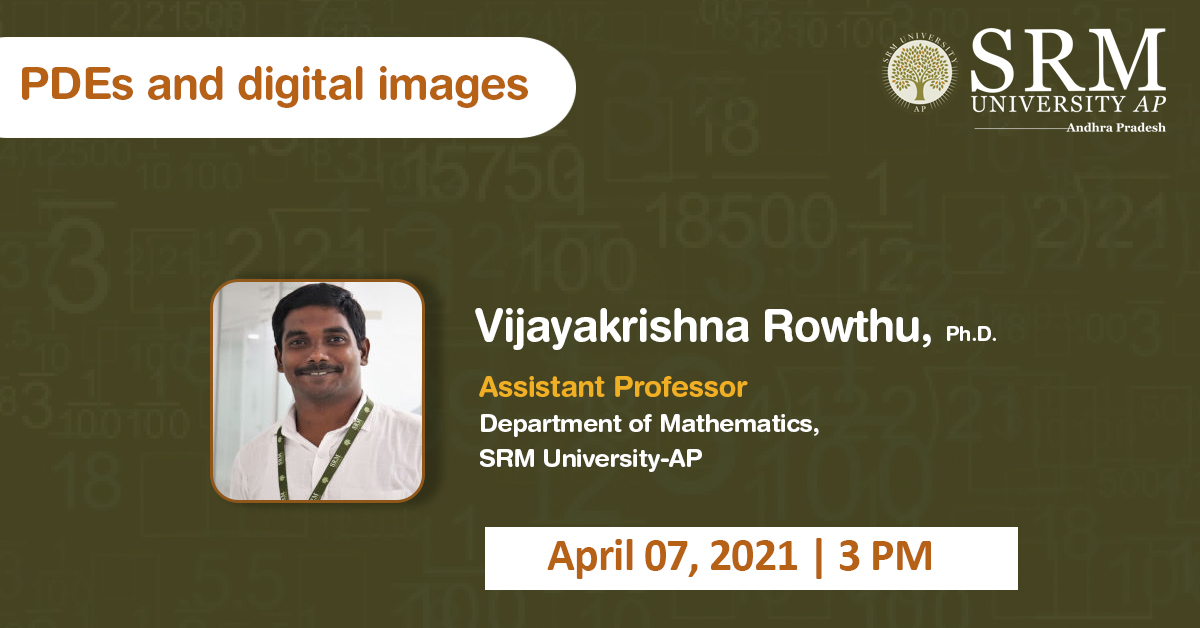 Department of Mathematics is back with another exciting version of the Departmental Seminars Series. This week, the Department of Mathematics invites the in-house mathematician Dr Vijayakrishna Rowthu to deliver a talk on “PDEs and Digital Images.” He is an Assistant Professor in the Department of Mathematics. The seminar has been scheduled for April 07, 2021, at 3 pm.
Department of Mathematics is back with another exciting version of the Departmental Seminars Series. This week, the Department of Mathematics invites the in-house mathematician Dr Vijayakrishna Rowthu to deliver a talk on “PDEs and Digital Images.” He is an Assistant Professor in the Department of Mathematics. The seminar has been scheduled for April 07, 2021, at 3 pm. Digital images are discrete versions of 2D functions defined over a rectangular bounded domain. In the language of Partial Differential Equations(PDE), a digital Image Processing Method(IPM) appears as an Initial Value Problem (IVP) where the initial value is an image, and the PDE mimics the processing part of the method. Unlike the traditional IPMs, the final outcome is not subjective but majorly depends on the convergence of the evolving solution over the time axis.
In this talk, various PDE models will be illustrated to showcase the benefits and to infuse enough mathematical rigour into the field of image processing itself. Mathematics enthusiasts are requested to avail this opportunity to listen to our distinguished speaker on April 07, at 3 pm.
Continue reading → - “GETTING GOAL DIRECTED”-Captivating session by Aayushi Sharma April 3, 2021
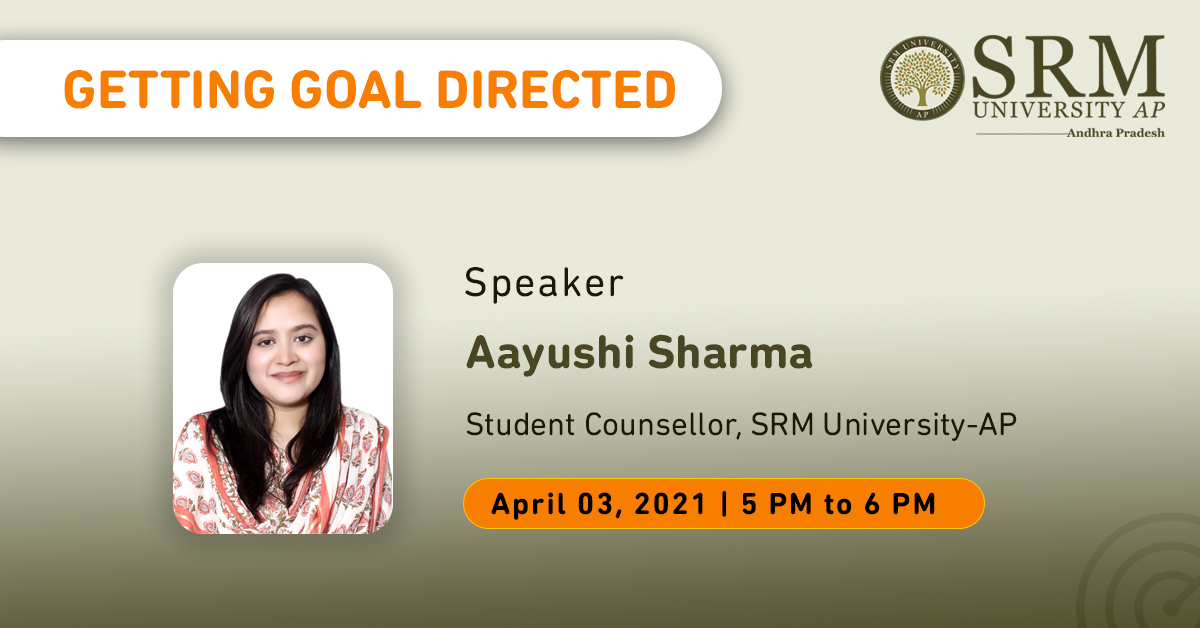 A worthy life is full of admirable goals with a fool-proof plan to achieve those. Be it completing the syllabus, getting a good job, living a peaceful life or retiring with enough money to live; all can be achieved with good planning only. In his celebrated book “Thinking Fast and Slow”, the noble laureate Daniel Kahneman opined, “Intelligence is not only the ability to reason; it is also the ability to find relevant material in memory and to deploy attention when needed.”
A worthy life is full of admirable goals with a fool-proof plan to achieve those. Be it completing the syllabus, getting a good job, living a peaceful life or retiring with enough money to live; all can be achieved with good planning only. In his celebrated book “Thinking Fast and Slow”, the noble laureate Daniel Kahneman opined, “Intelligence is not only the ability to reason; it is also the ability to find relevant material in memory and to deploy attention when needed.”Therefore, it need not be debated that only planning is not enough. You will need proper ways to execute it. This is where Aayushi Sharma comes into the picture. Ms Sharma is your Student counsellor and the appropriate person who can enlighten you on how to plan and turn those plans into actions. Join the captivating session with Ms Aayushi Sharma on April 03, 2021, at 5 pm to know more.
Continue reading → - “Overcoming Procrastination!-Doing Vs Delay”- in conversation with Dr Smita Sharma March 26, 2021
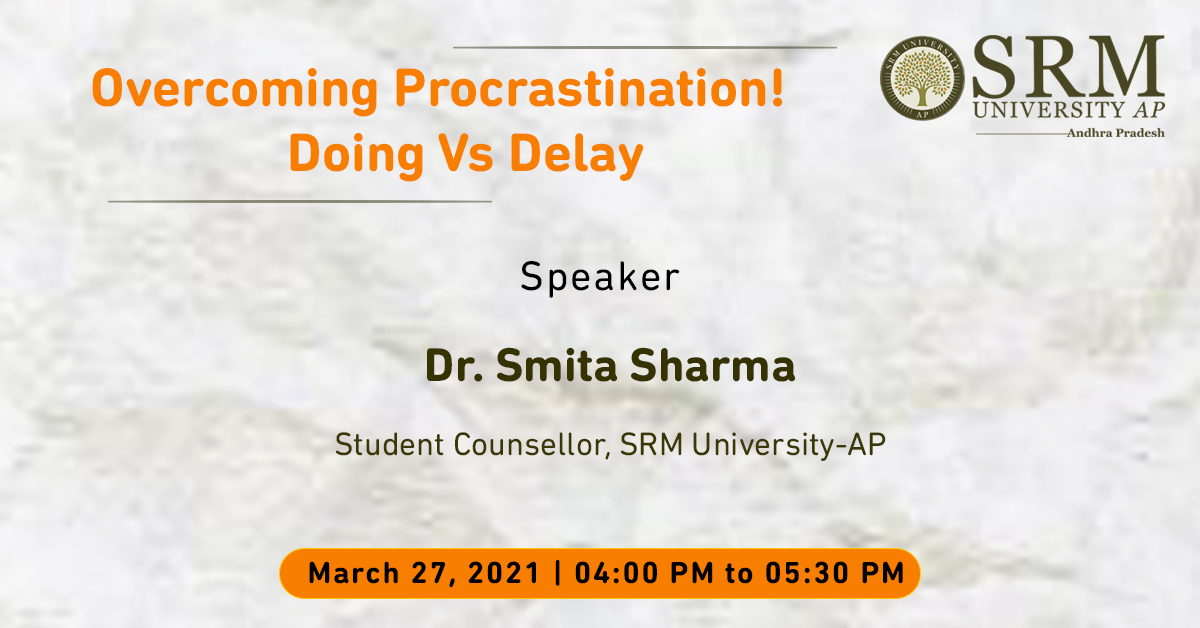 How many of you thought, “It’s just the beginning of the semester, there’s a lot of time to catch up with studies,” and then struggled with the syllabus before the exams? How many of you were frustrated with assignment submissions just because you did not start it on time? How many sleepless nights have you spent before taking the exams because the revision was due? We are sure that you all have experienced some kind of trouble because you put the work on hold. Admittedly, we all have a procrastinator within ourselves. We all love to postpone things a bit, allowing us some free time to enjoy ourselves. However, we often forget that all the work that is being piled up due to our procrastination will come back to us with a bitter consequence.
How many of you thought, “It’s just the beginning of the semester, there’s a lot of time to catch up with studies,” and then struggled with the syllabus before the exams? How many of you were frustrated with assignment submissions just because you did not start it on time? How many sleepless nights have you spent before taking the exams because the revision was due? We are sure that you all have experienced some kind of trouble because you put the work on hold. Admittedly, we all have a procrastinator within ourselves. We all love to postpone things a bit, allowing us some free time to enjoy ourselves. However, we often forget that all the work that is being piled up due to our procrastination will come back to us with a bitter consequence. A student’s life is a time to learn the essential skills that are going to support them in their future professional and personal growth. Doing tasks on time has its own substantial benefits that are not only going to help you in your academic career but also in every sphere of life. Do you find it to be too difficult to learn?
Dr Smita Sharma is the ideal person who can enlighten you on how procrastination affects our thinking and behaviour. She will further guide you with the techniques to defeat it. Dr Smita, as you know, is your counsellor at SRM University-AP, and she will be available in an Interactive session with you on “Overcoming Procrastination!-Doing Vs Delay”. Join the session on March 27, 2021, at 4 pm.
Continue reading → - Dr Chittaranjan Mishra to discuss “Fast pricing of multi-asset American options under jump-diffusion models” March 24, 2021
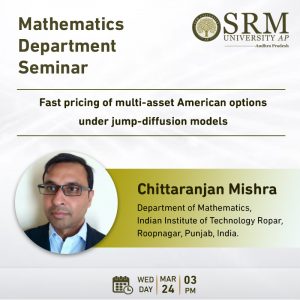 In the next chapter of Departmental Seminars Series, Department of Mathematics, SRM University-AP, Andhra Pradesh welcomes Dr Chittaranjan Mishra, Department of Mathematics, Indian Institute of Technology Ropar, to deliver a lecture on “Fast pricing of multi-asset American options under jump-diffusion models” on March 24, 2021, at 3 pm.
In the next chapter of Departmental Seminars Series, Department of Mathematics, SRM University-AP, Andhra Pradesh welcomes Dr Chittaranjan Mishra, Department of Mathematics, Indian Institute of Technology Ropar, to deliver a lecture on “Fast pricing of multi-asset American options under jump-diffusion models” on March 24, 2021, at 3 pm.Multi-asset American options are interesting in many ways, e.g., they give the holder the flexibility to exercise at any time up to maturity, allow for risk diversification and for us, these contracts are mathematically challenging to price due to the non-availability of a closed-form formula. When jumps are introduced to model underlying assets, one will be required to solve a partial integro-differential complementary problem (PIDCP) for pricing these contracts. In these cases, we find that computing sufficiently accurate option prices in real-time is extremely difficult. That is because the in hand PIDCP involves a multi-dimensional partial integro-differential equation with a non-local double integral term. Solving these multi-dimensional PIDCP by advanced numerical techniques, such as a customized finite difference method, is very time-consuming, as the corresponding discretization matrices are huge in size. More importantly, the integral approximation matrix is also dense, posing a serious challenge to handle storage memory. Many efficient techniques are proposed primarily to handle the double integral term. However, the required solving time is still not practicable for practitioners.
In our research, we exploit the amazing parallel architecture of modern graphics processing units (GPUs) to solve computationally expensive scientific problems. Nevertheless, resolving the problem at hand by employing a GPU is not straightforward. It requires one to overcome many bottlenecks, such as in. In this work, we have investigated these issues in order to achieve substantial speed-ups compared to a sequential FD implementation.
Mathematics enthusiasts are requested to avail this opportunity to listen to our distinguished speaker on March 24th, at 3 pm.
Continue reading →

